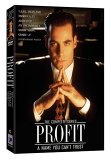| Reviews & Columns |
|
Reviews DVD TV on DVD Blu-ray 4K UHD International DVDs In Theaters Reviews by Studio Video Games Features Collector Series DVDs Easter Egg Database Interviews DVD Talk Radio Feature Articles Columns Anime Talk DVD Savant Horror DVDs The M.O.D. Squad Art House HD Talk Silent DVD
|
DVD Talk Forum |
|
|
| Resources |
|
DVD Price Search Customer Service #'s RCE Info Links |
|
Columns
|
|
|
Profit: The Complete Series
Starz / Anchor Bay // Unrated // August 9, 2005
List Price: $29.98 [Buy now and save at Amazon]
There's one scene that reflexively springs to mind when most people think of Psycho, but the part that I find the most compelling comes a few minutes later. After Marion Crane is brutally stabbed in the shower, Norman Bates sets out to dispose of the evidence, placing her remains into the trunk 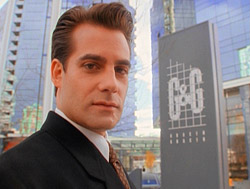 of her car and pushing it into a nearby lake. There's a moment where the car stops sinking, and although I've seen Psycho many times and with many different people, the reaction's always the same. The audience's hearts skip a beat -- they want to see the evidence sink into that murky grave. It's not that unusual to root for the villain. Take any slasher movie: who really wants to see some dimwitted, half-stoned teenager stumble out of the path of a razor-fingered glove or a chainsaw? How many people played through Bioware's Star Wars: Knights of the Old Republic without giving the Dark Side a spin?
of her car and pushing it into a nearby lake. There's a moment where the car stops sinking, and although I've seen Psycho many times and with many different people, the reaction's always the same. The audience's hearts skip a beat -- they want to see the evidence sink into that murky grave. It's not that unusual to root for the villain. Take any slasher movie: who really wants to see some dimwitted, half-stoned teenager stumble out of the path of a razor-fingered glove or a chainsaw? How many people played through Bioware's Star Wars: Knights of the Old Republic without giving the Dark Side a spin?
It's hopefully pretty clear where I'm going with all of this. Profit doesn't star an eager, idealistic go-getter who's plucked from the Midwest and hopes to make his mark on corporate America. No, the dark, sticky underbelly is exposed in a TV show without any good guys. At best, they're morally conflicted -- an underpaid assistant embezzling a few hundred bucks from the company coffers here and there to offset the costs of an expensive nursing home or an executive carrying on an affair while his lush of a wife is off boozing it up somewhere. At worst, they're...well, Jim Profit.
Profit's not his real name, of course. His childhood was spent in Oklahoma, where his overworked father left him in a cardboard moving box with a hole cut out so he could watch TV. When Jim struck out on his own at fifteen, nearly all remnants of his past life were torched, his abusive father included. He re-emerged years later at the corporate offices of Gracen and Gracen, a multi-billion dollar conglomerate that produces everything from laptops to cosmetics...not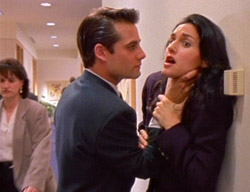 to mention the cardboard box in which he grew up. He has no family. He has no friends. All that matters is clawing his way up the corporate ladder, preying on the weaknesses of and deftly manipulating anyone who can help him in his quest for the brass ring of President of Acquisitions. Sometimes it's a simple matter of flattery or bribery. More frequently it's blackmail and...well, there really isn't any limit to what someone completely devoid of a conscience is willing to do.
to mention the cardboard box in which he grew up. He has no family. He has no friends. All that matters is clawing his way up the corporate ladder, preying on the weaknesses of and deftly manipulating anyone who can help him in his quest for the brass ring of President of Acquisitions. Sometimes it's a simple matter of flattery or bribery. More frequently it's blackmail and...well, there really isn't any limit to what someone completely devoid of a conscience is willing to do.
Although the show revolves around the title character played by Adrian Pasdar, Profit has a pretty intriguing supporting cast. Aside from the cardboard box he still curls up in every night, Profit's only other link to his past life is Bobbi Stakowski (Lisa Blount), a brash, impulsive heroin addict who also happens to be his stepmother. The loudmouthed Bobbi stumbles onto Jim's new identity and blackmails an overly posh lifestyle out of him, along with more carnal, Oedipal demands. The two endlessly manipulate one other, but Profit often manages to find some way to fit her into his mechinations at Gracen and Gracen. Another partner in crime is the well-meaning executive secretary Gail Koner (Lisa Darr), who's initially blackmailed into helping Profit after he discovers she's been embezzling small amounts of money to help cover her ailing mother's exorbitant medical expenses. In her ploy to do more than just make coffees and copies, Gail finds herself drawn deeper and deeper into Profit's schemes.
Keith Szarabajka (who would reteam with producer David Greenwalt as Daniel Holtz on the third season of Angel) plays Chaz, the gruff, philandering CEO of Gracen and Gracen. Chaz' alcoholic younger brother Pete (Jack Gwaltney) is next in line for the President of Acquisitions throne that Profit is gunning for, and Profit also toys with the affections of Pete's lonely wife Nora (Allison Hossack). I'd have given this set a positive write-up even if it had been nothing but seven hours of Hossack doing crossword puzzles, but thankfully there's a lot more to recommend here than just a very pretty face. Naturally, Jim Profit has several nemeses at the company -- Jack Walters (Scott Paulin),
the widely-respected man Profit muscled out, overly-driven security specialist Joanne Meltzer (Lisa Zane), and Jeffrey Sykes (Sherman Augustus), a headline-grabbing attorney with a vengeful streak.
Profit strikes a pretty difficult balancing act, and it easily could have gone too far in either direction. The series doesn't pull its punches. It doesn't overhumanize Jim Profit or try to use his troubled past as a blanket excuse for everything he does. It doesn't try to pretend that Profit's some sort of hero for screwing everyone over the way he does. At the same time, Jim Profit really doesn't seem like that bad a guy in the course of the show, at least not by comparison. Even with all the blackmail, bribery, and manipulation, he's not doing anything the competition wouldn't be willing to do. He just has a mind deranged enough to think up these elaborate plans and a strong enough backbone to carry them out. Profit doesn't enjoy devastating people's lives (he rarely exhibits any genuine emotion at all), and he doesn't go to measures that extreme indiscriminately. No need to play an ace when a 2 will do. He has a strong sense of family, despite not really having one of his own, and the writers spend a good bit of time playing with the concept of Gracen and Gracen substituting as such.
I had a blast watching Profit. Even though everything I've written up to this point pegs the series as a drama, it's almost as much a comedy, although it's the type of show that manages to be really funny without drawing attention to itself that way. Sometimes it's a deeply dark sense of humor, the kind that's more likely to coax a sinister grin than a belly laugh, but it's often the cynical, sarcastic edge of its characters that gets the biggest response. There's violence. Murder. Sex. Lots of sex. Lots of women's bare backs. It's an incredibly fast-moving series, and my nearly seven hour long marathon felt closer to half that. The way various subplots keep running throughout instead of each episode just being a wholly self-contained corporate-acquisition-of-the-week contributes greatly to that as well. I'm impressed with the structure of the show too -- it's densely plotted and avoids sticking to any stock formula. There are times when Profit's in the middle of executing one of his schemes, and nearly half the episode will go by before it's revealed what it is he's trying to accomplish, exactly. There are numerous twists, and even if one of Profit's elaborate plans goes exactly the way he intended, the end result still might not be precisely what he had in mind. I'd struggle to find much of anything negative to say about it: the premise, the characters, the writing, and the cast are all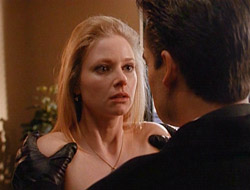 fantastic. Portions of it do feel somewhat dated -- the dimly-lit hidden room where a naked Jim Profit hammers away at a computer looks kind of low-rent, women have a tendency to overdramatically disrobe with their backs to the camera, there's a bizarrely edited car crash in the finalé, and the office computers use a cumbersome 3-D, first-person GUI with headshots of various employees plastered over goofy wireframe models. Don't let complaints that ridiculously minor steer you away, though -- Profit holds up remarkably well, arguably playing better today than it did nine years ago.
fantastic. Portions of it do feel somewhat dated -- the dimly-lit hidden room where a naked Jim Profit hammers away at a computer looks kind of low-rent, women have a tendency to overdramatically disrobe with their backs to the camera, there's a bizarrely edited car crash in the finalé, and the office computers use a cumbersome 3-D, first-person GUI with headshots of various employees plastered over goofy wireframe models. Don't let complaints that ridiculously minor steer you away, though -- Profit holds up remarkably well, arguably playing better today than it did nine years ago.
Despite its unconventional premise, Profit opened to great critical acclaim...and as is the case with pretty much any series where "critical acclaim" and "Fox" are uttered in the same breath, it was quickly canned. The entirety of the series consists of the feature-length pilot and seven episodes, four of which were never seen in the U.S. until now. Intrigued viewers don't have to worry that they're forking over their credit cards to buy an incomplete story; even though Profit was cut short, its final episode is a fitting close to the series. Profit is a fairly serialized show with several plotlines introduced throughout, and all of those dangling threads are neatly wrapped up in or around the final episode with one easily overlooked exception.
Profit has been yanked out of obscurity by Anchor Bay, who have packaged the entire run of the series onto this three-disc set. Nearly five hours of extras have been provided as well, including an hour long documentary and a number of audio commentaries with the show's creators and star.
Video: Since these full-frame transfers were presumably lifted from the original broadcast masters, it's probably safe to assume that most of their flaws were present when at least some of these episodes first aired on Fox nearly ten years ago. The pilot is soft and smeary, but the other seven episodes in the set are crisper and more detailed than I'd expect from an analog TV broadcast. The most glaring problem is with its palette.
A decent amount of Profit has a brownish-yellow tint to it, at times looking almost sepia-toned, and that's not just because of the sterile corporate office setting. It looks at times like much of the cast suffer from jaundice, although color saturation can vary within the space of a single scene. You'll have Jim Profit with a face so orange that it looks like he got his tan off the shelf at Walgreens, then it'll cut to a jaundiced former employee with yellow lips, and that'll be quickly followed by a different angle of the same person that looks pinker and ruddier. The shifts in color aren't jarring or overwhelming, but you don't have to look that hard to spot 'em either. Otherwise, it's more or less what I expected.
Audio: The Dolby Digital stereo audio (192Kbps) is decent enough too. The music by Mike Post and Walter Murphy sounds pretty robust, and although there's a little bit of background noise and the occasional electronic squeal, the series' dialogue remains clear and discernable throughout. There are no subtitles or dubbed soundtracks, although closed captions are offered.
Supplements: Star Adrian Pasdar joins creators David Greenwalt and John McNamara for several different audio commentaries -- the pilot on disc one, "Healing" and "Chinese Box" on disc two, and "Forgiveness" on disc three. That leaves them with more than three and a half hours to fill, and it's understandable that they'd eventually run out of things to talk about. "Healing" has some comments about character insight and the visual presentation of the show (and some shameless theft from The Commish!), but the bulk of it is little more than the three of them laughing. Long stretches of "Forgiveness" are completely silent; they just seem to be sitting back and just watching the episode, periodically spouting off a sentence or two about whatever's happening on-screen. They comment on that one unresolved plot thread and the direction that was going to take in season two, and they also quip about the goofiness of the no-budget car crash.
The other two commentaries make up for them, though. The most substantial of the bunch is their track for the feature-length pilot, covering the genesis of the project, tainting a house widely used in Vancouver film shoots, and the importance hair holds when you start working in television. What I found most interesting were the comments on what would've happened in season two, including stories involving the record industry, a run for Senate, and a manufactured murder plot. A three script order had been issued for the aborted second season, including one installment written by Howard Chaykin. Unfortunately, none of those completed scripts made their way to this DVD. "Chinese Box" offers some comments about one scene directed by none other than Adrian Pasdar himself, the influence McNamara's reliance on morphine following an operation to stop snoring had on Chaz Gracen's drug addiction, and the censors' overreaction to the then-racy-but-now-not-so-much lesbian storyline. They also reminded me why Dr. Batewell looked so naggingly familiar -- he's played by Deadwood's John Hawkes.
Greenwalt, McNamara, and Pasdar are also part of the hour-plus documentary "Greed Kills", which includes additional comments by producer Stephen J. Cannell and actresses Lisa Zane and Lisa Blount. It's as comprehensive as you'd probably expect, given its length. The writers and producers are the dominant presence early on, noting how their concept of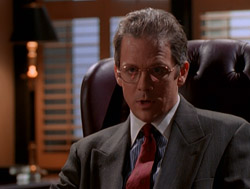 Richard III for television was developed and produced, and how the concept wasn't always particularly well-received (they were kicked out of CBS mid-pitch). Quite a bit of time is spent delving into the mindset of its characters and commenting about the cast. They also talk about the use of voiceover throughout the series, the tight structure and dense plotting, and their struggles with the network, particularly in regards to sex and lesbianism. Finally, they comment on the financial catastrophe of producing a show with such a small order that hemorrhaged viewers throughout the course of a single episode, and they also offer their response to such a quick cancellation. Although there's quite a bit of overlap with the audio commentaries, this is still a very entertaining documentary and is worth taking the time to watch.
Richard III for television was developed and produced, and how the concept wasn't always particularly well-received (they were kicked out of CBS mid-pitch). Quite a bit of time is spent delving into the mindset of its characters and commenting about the cast. They also talk about the use of voiceover throughout the series, the tight structure and dense plotting, and their struggles with the network, particularly in regards to sex and lesbianism. Finally, they comment on the financial catastrophe of producing a show with such a small order that hemorrhaged viewers throughout the course of a single episode, and they also offer their response to such a quick cancellation. Although there's quite a bit of overlap with the audio commentaries, this is still a very entertaining documentary and is worth taking the time to watch.
Highlighting "Disc Three" on the menu of the third DVD uncovers an Easter Egg about the prolonged shooting of a Profit TV spot. Rounding out the extras are plugs for Anchor Bay's TV-on-DVD releases of Titus and Doogie Howser M.D..
Aside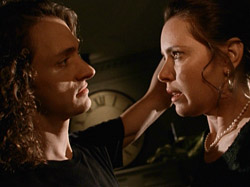 from all of the other extras, producer Jo Swerling contributes a comprehensive set of liner notes. Profit comes packaged in two slimline keepcases, the first of which houses two discs. Lists of episodes and a brief synopsis of each can be found on the flipsides of these cases, although the design looks like it was hammered out in four minutes in Microsoft Word. The packaging otherwise looks pretty nice, making use of large promotional stills from the show, although I have to question prominently displaying those schlocky computer models on the back of the slipcase. There's no 'play all' feature, but there are so few episodes that selecting them individually isn't that overwhelming an effort. The individual episodes aren't divided into chapter stops.
from all of the other extras, producer Jo Swerling contributes a comprehensive set of liner notes. Profit comes packaged in two slimline keepcases, the first of which houses two discs. Lists of episodes and a brief synopsis of each can be found on the flipsides of these cases, although the design looks like it was hammered out in four minutes in Microsoft Word. The packaging otherwise looks pretty nice, making use of large promotional stills from the show, although I have to question prominently displaying those schlocky computer models on the back of the slipcase. There's no 'play all' feature, but there are so few episodes that selecting them individually isn't that overwhelming an effort. The individual episodes aren't divided into chapter stops.
Conclusion: Maybe middle America didn't want a series as dark and unconventional as Profit back in 1996. The success of shows like The Sopranos in the years that followed shows that there's certainly a market for it now, and hopefully Profit will fare better on home video than it did on Fox. (Feel free to pretend I made some incomprehensibly lame quip about this set pulling a "profit" for Anchor Bay.) Great show. Quality extras. A sticker price less than $20 shipped at a couple of online stores. Highly Recommended.
 of her car and pushing it into a nearby lake. There's a moment where the car stops sinking, and although I've seen Psycho many times and with many different people, the reaction's always the same. The audience's hearts skip a beat -- they want to see the evidence sink into that murky grave. It's not that unusual to root for the villain. Take any slasher movie: who really wants to see some dimwitted, half-stoned teenager stumble out of the path of a razor-fingered glove or a chainsaw? How many people played through Bioware's Star Wars: Knights of the Old Republic without giving the Dark Side a spin?
of her car and pushing it into a nearby lake. There's a moment where the car stops sinking, and although I've seen Psycho many times and with many different people, the reaction's always the same. The audience's hearts skip a beat -- they want to see the evidence sink into that murky grave. It's not that unusual to root for the villain. Take any slasher movie: who really wants to see some dimwitted, half-stoned teenager stumble out of the path of a razor-fingered glove or a chainsaw? How many people played through Bioware's Star Wars: Knights of the Old Republic without giving the Dark Side a spin? It's hopefully pretty clear where I'm going with all of this. Profit doesn't star an eager, idealistic go-getter who's plucked from the Midwest and hopes to make his mark on corporate America. No, the dark, sticky underbelly is exposed in a TV show without any good guys. At best, they're morally conflicted -- an underpaid assistant embezzling a few hundred bucks from the company coffers here and there to offset the costs of an expensive nursing home or an executive carrying on an affair while his lush of a wife is off boozing it up somewhere. At worst, they're...well, Jim Profit.
Profit's not his real name, of course. His childhood was spent in Oklahoma, where his overworked father left him in a cardboard moving box with a hole cut out so he could watch TV. When Jim struck out on his own at fifteen, nearly all remnants of his past life were torched, his abusive father included. He re-emerged years later at the corporate offices of Gracen and Gracen, a multi-billion dollar conglomerate that produces everything from laptops to cosmetics...not
 to mention the cardboard box in which he grew up. He has no family. He has no friends. All that matters is clawing his way up the corporate ladder, preying on the weaknesses of and deftly manipulating anyone who can help him in his quest for the brass ring of President of Acquisitions. Sometimes it's a simple matter of flattery or bribery. More frequently it's blackmail and...well, there really isn't any limit to what someone completely devoid of a conscience is willing to do.
to mention the cardboard box in which he grew up. He has no family. He has no friends. All that matters is clawing his way up the corporate ladder, preying on the weaknesses of and deftly manipulating anyone who can help him in his quest for the brass ring of President of Acquisitions. Sometimes it's a simple matter of flattery or bribery. More frequently it's blackmail and...well, there really isn't any limit to what someone completely devoid of a conscience is willing to do. Although the show revolves around the title character played by Adrian Pasdar, Profit has a pretty intriguing supporting cast. Aside from the cardboard box he still curls up in every night, Profit's only other link to his past life is Bobbi Stakowski (Lisa Blount), a brash, impulsive heroin addict who also happens to be his stepmother. The loudmouthed Bobbi stumbles onto Jim's new identity and blackmails an overly posh lifestyle out of him, along with more carnal, Oedipal demands. The two endlessly manipulate one other, but Profit often manages to find some way to fit her into his mechinations at Gracen and Gracen. Another partner in crime is the well-meaning executive secretary Gail Koner (Lisa Darr), who's initially blackmailed into helping Profit after he discovers she's been embezzling small amounts of money to help cover her ailing mother's exorbitant medical expenses. In her ploy to do more than just make coffees and copies, Gail finds herself drawn deeper and deeper into Profit's schemes.
Keith Szarabajka (who would reteam with producer David Greenwalt as Daniel Holtz on the third season of Angel) plays Chaz, the gruff, philandering CEO of Gracen and Gracen. Chaz' alcoholic younger brother Pete (Jack Gwaltney) is next in line for the President of Acquisitions throne that Profit is gunning for, and Profit also toys with the affections of Pete's lonely wife Nora (Allison Hossack). I'd have given this set a positive write-up even if it had been nothing but seven hours of Hossack doing crossword puzzles, but thankfully there's a lot more to recommend here than just a very pretty face. Naturally, Jim Profit has several nemeses at the company -- Jack Walters (Scott Paulin),
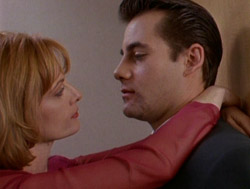 |
| "Hi, Mom." |
Profit strikes a pretty difficult balancing act, and it easily could have gone too far in either direction. The series doesn't pull its punches. It doesn't overhumanize Jim Profit or try to use his troubled past as a blanket excuse for everything he does. It doesn't try to pretend that Profit's some sort of hero for screwing everyone over the way he does. At the same time, Jim Profit really doesn't seem like that bad a guy in the course of the show, at least not by comparison. Even with all the blackmail, bribery, and manipulation, he's not doing anything the competition wouldn't be willing to do. He just has a mind deranged enough to think up these elaborate plans and a strong enough backbone to carry them out. Profit doesn't enjoy devastating people's lives (he rarely exhibits any genuine emotion at all), and he doesn't go to measures that extreme indiscriminately. No need to play an ace when a 2 will do. He has a strong sense of family, despite not really having one of his own, and the writers spend a good bit of time playing with the concept of Gracen and Gracen substituting as such.
I had a blast watching Profit. Even though everything I've written up to this point pegs the series as a drama, it's almost as much a comedy, although it's the type of show that manages to be really funny without drawing attention to itself that way. Sometimes it's a deeply dark sense of humor, the kind that's more likely to coax a sinister grin than a belly laugh, but it's often the cynical, sarcastic edge of its characters that gets the biggest response. There's violence. Murder. Sex. Lots of sex. Lots of women's bare backs. It's an incredibly fast-moving series, and my nearly seven hour long marathon felt closer to half that. The way various subplots keep running throughout instead of each episode just being a wholly self-contained corporate-acquisition-of-the-week contributes greatly to that as well. I'm impressed with the structure of the show too -- it's densely plotted and avoids sticking to any stock formula. There are times when Profit's in the middle of executing one of his schemes, and nearly half the episode will go by before it's revealed what it is he's trying to accomplish, exactly. There are numerous twists, and even if one of Profit's elaborate plans goes exactly the way he intended, the end result still might not be precisely what he had in mind. I'd struggle to find much of anything negative to say about it: the premise, the characters, the writing, and the cast are all
 fantastic. Portions of it do feel somewhat dated -- the dimly-lit hidden room where a naked Jim Profit hammers away at a computer looks kind of low-rent, women have a tendency to overdramatically disrobe with their backs to the camera, there's a bizarrely edited car crash in the finalé, and the office computers use a cumbersome 3-D, first-person GUI with headshots of various employees plastered over goofy wireframe models. Don't let complaints that ridiculously minor steer you away, though -- Profit holds up remarkably well, arguably playing better today than it did nine years ago.
fantastic. Portions of it do feel somewhat dated -- the dimly-lit hidden room where a naked Jim Profit hammers away at a computer looks kind of low-rent, women have a tendency to overdramatically disrobe with their backs to the camera, there's a bizarrely edited car crash in the finalé, and the office computers use a cumbersome 3-D, first-person GUI with headshots of various employees plastered over goofy wireframe models. Don't let complaints that ridiculously minor steer you away, though -- Profit holds up remarkably well, arguably playing better today than it did nine years ago. Despite its unconventional premise, Profit opened to great critical acclaim...and as is the case with pretty much any series where "critical acclaim" and "Fox" are uttered in the same breath, it was quickly canned. The entirety of the series consists of the feature-length pilot and seven episodes, four of which were never seen in the U.S. until now. Intrigued viewers don't have to worry that they're forking over their credit cards to buy an incomplete story; even though Profit was cut short, its final episode is a fitting close to the series. Profit is a fairly serialized show with several plotlines introduced throughout, and all of those dangling threads are neatly wrapped up in or around the final episode with one easily overlooked exception.
Profit has been yanked out of obscurity by Anchor Bay, who have packaged the entire run of the series onto this three-disc set. Nearly five hours of extras have been provided as well, including an hour long documentary and a number of audio commentaries with the show's creators and star.
Video: Since these full-frame transfers were presumably lifted from the original broadcast masters, it's probably safe to assume that most of their flaws were present when at least some of these episodes first aired on Fox nearly ten years ago. The pilot is soft and smeary, but the other seven episodes in the set are crisper and more detailed than I'd expect from an analog TV broadcast. The most glaring problem is with its palette.
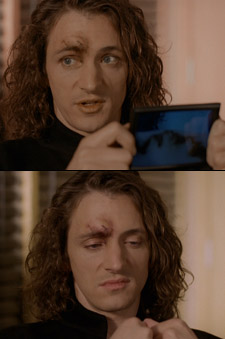 |
| Case in point about how the colors are a little wonky. Compare the lips and head wound. |
Audio: The Dolby Digital stereo audio (192Kbps) is decent enough too. The music by Mike Post and Walter Murphy sounds pretty robust, and although there's a little bit of background noise and the occasional electronic squeal, the series' dialogue remains clear and discernable throughout. There are no subtitles or dubbed soundtracks, although closed captions are offered.
Supplements: Star Adrian Pasdar joins creators David Greenwalt and John McNamara for several different audio commentaries -- the pilot on disc one, "Healing" and "Chinese Box" on disc two, and "Forgiveness" on disc three. That leaves them with more than three and a half hours to fill, and it's understandable that they'd eventually run out of things to talk about. "Healing" has some comments about character insight and the visual presentation of the show (and some shameless theft from The Commish!), but the bulk of it is little more than the three of them laughing. Long stretches of "Forgiveness" are completely silent; they just seem to be sitting back and just watching the episode, periodically spouting off a sentence or two about whatever's happening on-screen. They comment on that one unresolved plot thread and the direction that was going to take in season two, and they also quip about the goofiness of the no-budget car crash.
The other two commentaries make up for them, though. The most substantial of the bunch is their track for the feature-length pilot, covering the genesis of the project, tainting a house widely used in Vancouver film shoots, and the importance hair holds when you start working in television. What I found most interesting were the comments on what would've happened in season two, including stories involving the record industry, a run for Senate, and a manufactured murder plot. A three script order had been issued for the aborted second season, including one installment written by Howard Chaykin. Unfortunately, none of those completed scripts made their way to this DVD. "Chinese Box" offers some comments about one scene directed by none other than Adrian Pasdar himself, the influence McNamara's reliance on morphine following an operation to stop snoring had on Chaz Gracen's drug addiction, and the censors' overreaction to the then-racy-but-now-not-so-much lesbian storyline. They also reminded me why Dr. Batewell looked so naggingly familiar -- he's played by Deadwood's John Hawkes.
Greenwalt, McNamara, and Pasdar are also part of the hour-plus documentary "Greed Kills", which includes additional comments by producer Stephen J. Cannell and actresses Lisa Zane and Lisa Blount. It's as comprehensive as you'd probably expect, given its length. The writers and producers are the dominant presence early on, noting how their concept of
 Richard III for television was developed and produced, and how the concept wasn't always particularly well-received (they were kicked out of CBS mid-pitch). Quite a bit of time is spent delving into the mindset of its characters and commenting about the cast. They also talk about the use of voiceover throughout the series, the tight structure and dense plotting, and their struggles with the network, particularly in regards to sex and lesbianism. Finally, they comment on the financial catastrophe of producing a show with such a small order that hemorrhaged viewers throughout the course of a single episode, and they also offer their response to such a quick cancellation. Although there's quite a bit of overlap with the audio commentaries, this is still a very entertaining documentary and is worth taking the time to watch.
Richard III for television was developed and produced, and how the concept wasn't always particularly well-received (they were kicked out of CBS mid-pitch). Quite a bit of time is spent delving into the mindset of its characters and commenting about the cast. They also talk about the use of voiceover throughout the series, the tight structure and dense plotting, and their struggles with the network, particularly in regards to sex and lesbianism. Finally, they comment on the financial catastrophe of producing a show with such a small order that hemorrhaged viewers throughout the course of a single episode, and they also offer their response to such a quick cancellation. Although there's quite a bit of overlap with the audio commentaries, this is still a very entertaining documentary and is worth taking the time to watch. Highlighting "Disc Three" on the menu of the third DVD uncovers an Easter Egg about the prolonged shooting of a Profit TV spot. Rounding out the extras are plugs for Anchor Bay's TV-on-DVD releases of Titus and Doogie Howser M.D..
Aside
 from all of the other extras, producer Jo Swerling contributes a comprehensive set of liner notes. Profit comes packaged in two slimline keepcases, the first of which houses two discs. Lists of episodes and a brief synopsis of each can be found on the flipsides of these cases, although the design looks like it was hammered out in four minutes in Microsoft Word. The packaging otherwise looks pretty nice, making use of large promotional stills from the show, although I have to question prominently displaying those schlocky computer models on the back of the slipcase. There's no 'play all' feature, but there are so few episodes that selecting them individually isn't that overwhelming an effort. The individual episodes aren't divided into chapter stops.
from all of the other extras, producer Jo Swerling contributes a comprehensive set of liner notes. Profit comes packaged in two slimline keepcases, the first of which houses two discs. Lists of episodes and a brief synopsis of each can be found on the flipsides of these cases, although the design looks like it was hammered out in four minutes in Microsoft Word. The packaging otherwise looks pretty nice, making use of large promotional stills from the show, although I have to question prominently displaying those schlocky computer models on the back of the slipcase. There's no 'play all' feature, but there are so few episodes that selecting them individually isn't that overwhelming an effort. The individual episodes aren't divided into chapter stops. Conclusion: Maybe middle America didn't want a series as dark and unconventional as Profit back in 1996. The success of shows like The Sopranos in the years that followed shows that there's certainly a market for it now, and hopefully Profit will fare better on home video than it did on Fox. (Feel free to pretend I made some incomprehensibly lame quip about this set pulling a "profit" for Anchor Bay.) Great show. Quality extras. A sticker price less than $20 shipped at a couple of online stores. Highly Recommended.
|
| Popular Reviews |
| Sponsored Links |
|
|
| Sponsored Links |
|
|
| Release List | Reviews | Shop | Newsletter | Forum | DVD Giveaways | Blu-Ray | Advertise |
|
Copyright 2024 DVDTalk.com All Rights Reserved. Legal Info, Privacy Policy, Terms of Use,
Manage Preferences,
Your Privacy Choices | |||||||









